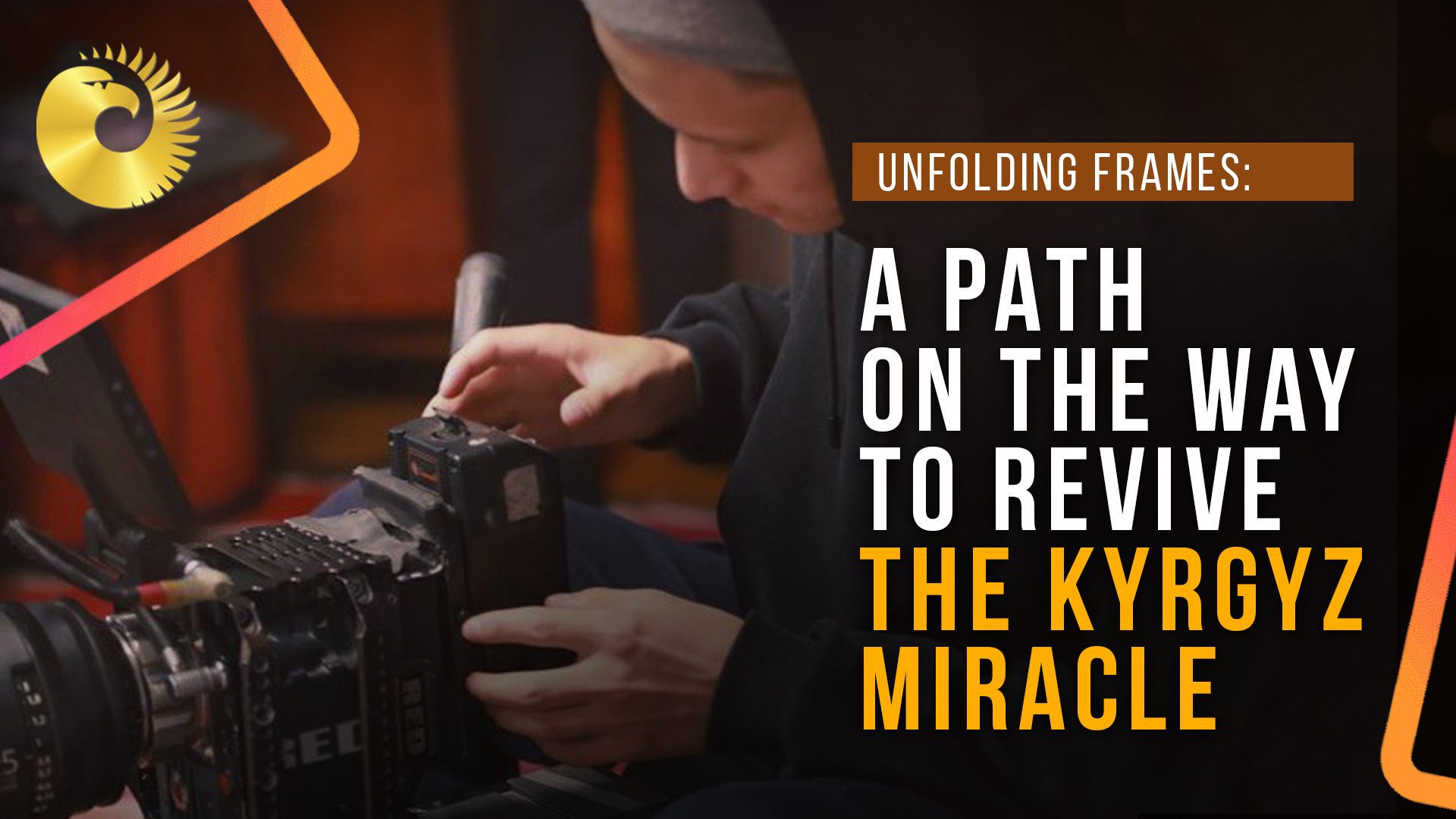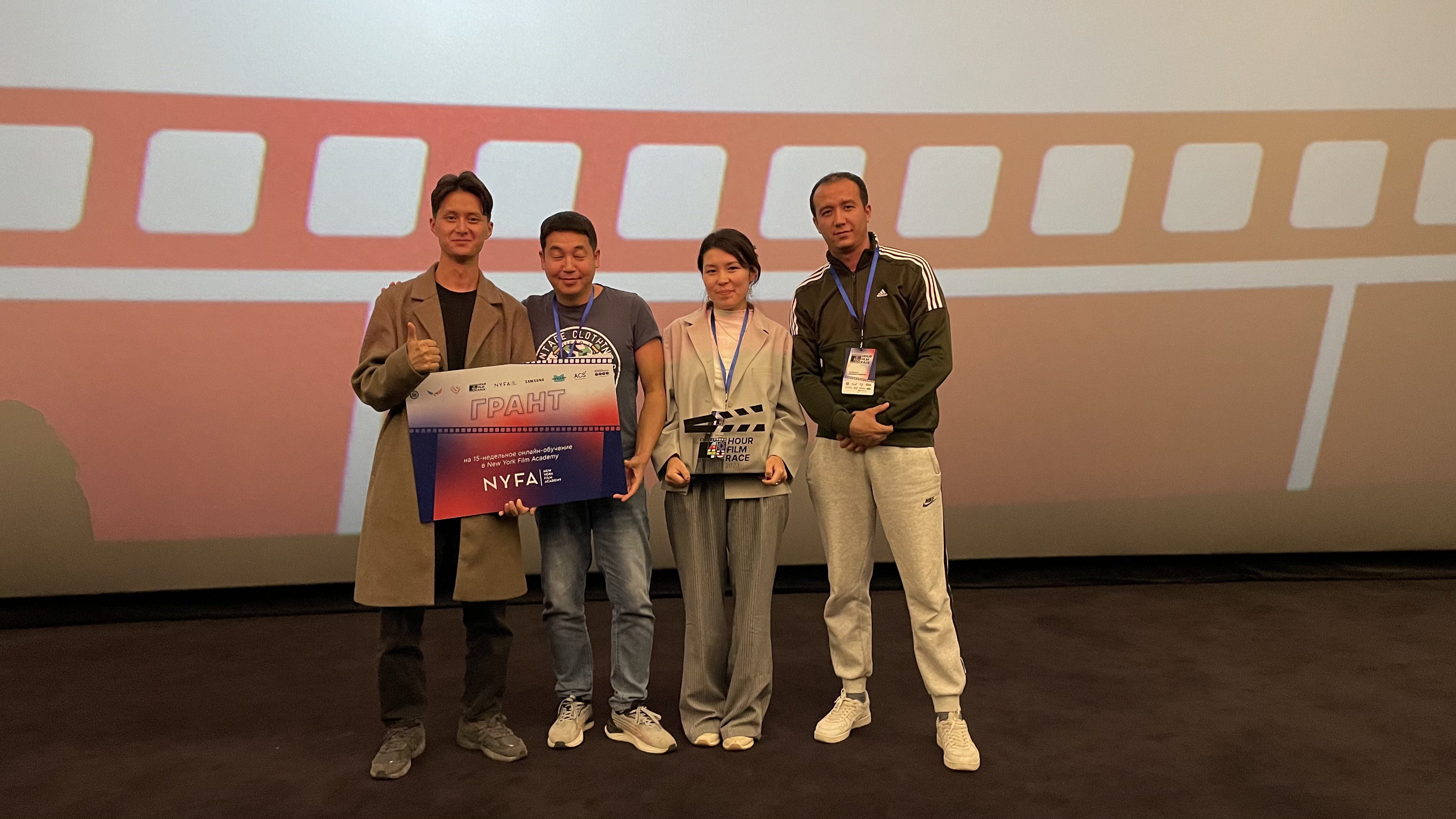May 17, 2024

Under the bright light of a softbox, a young man is bowing low toward the ground, his head almost parallel to his knees. He holds a massive-looking camera in his hands with multiple cords sticking out and various little devices attached to their ends. His eyes are focused on the camera screen, eyebrows frowned. If you look at him long enough, you will notice the smooth, subtle swaying movements he makes with his whole body. As he uncurls, the man lowers the camera and quickly gazes over the setup, then moves to film a different angle. Focused on the process, he doesn't drop a single word — until the camera stops recording.
��
This young man — Baiel Chynaliev — is only 21. When he starts speaking off-record, his voice sounds deep and calm. The cap he just took off is now hanging on one of the many straps of his carpenter jeans, which also have about seven pockets. The man refers to them as “filming pants” — multiple straps and pockets are handy for small camera attachments and devices. Camera work, all in all, is a tremendous part of Baiel’s life that has left its mark on many features of his personality.
Baiel on set of Adilet Karzhoev’s “Burul”
��
Despite his youth, Baiel has more experience in photography and film than some university graduates. Baiel’s passion for film began back in high school. He got the first camera he ever held from his uncle, who led a wedding videography business in Baiel’s hometown Kerben — a small town in Jalal-Abad close to the border with Uzbekistan. “I thought I looked cooler with a camera,” says Baiel, as he recollects those early years. Later, the schoolboy joined his uncle’s business. After weeks of shadowing the videographer, he finally got to hold a camera on his own. Baiel still vividly remembers the emotions he felt when filming some of the especially sentimental moments of the weddings he worked at. The bride leaving her parents’ home, the crying mothers, fathers, and brothers never left the young man’s heart untouched.��
Baiel working as a photographer at the
Legends Of Barcelona vs. Legends of CA football competition
��
With time and hard work, Baiel’s skills grew exponentially. He worked longer hours and consumed tons of YouTube videos about camera work, video shooting, and editing. Sometimes, he would sit and edit his videos for 20 hours straight without getting up. “I kept trying to do something cool, but they [employers] wouldn’t let me. They told me to do it like everyone else,” he remarks, smiling sarcastically. The constraint on his creativity turned something Baiel once loved into mundane labor. The young man’s career reached a breaking point when he faced an especially harsh situation on one of the workdays:
��
“Once, the client didn’t pay me anything for a whole day of work. I left and was sitting at a bus stop in the middle of nowhere with no money, snuggling my camera close to my chest and crying. I swear, I thought I would sell the camera after that and never film again. I hated it.”
��
Shortly after, Baiel left the job. He graduated high school and made college plans — the choice fell on the Department of Business Administration at the �鶹��ý. Determined never to pursue a professional film career, he applied. Then — failed.��
��
“My goal was to get a full scholarship to study at BA since I didn’t have money to pay for tuition. When I didn’t get it, I thought I might as well try applying for something that really interests me.”
��
So he tried �鶹��ý’s TV, Cinema, and Media Arts instead — and got in with a grant. None of Baiel’s friends or family knew about this decision up until the beginning of the academic year.��
��
“When I told my mom I got into TCMA, she laughed and said: ‘Are you going to film weddings with a diploma?’ I replied: ‘No. I am going to make my own films, Mom.’”
��
Two years later, Baiel and his team participated in the 48-hour Film Race, a competition of short films made from scratch in 48 hours by teams from Central Asia, and won an educational grant from the New York Film Academy. Making a film in two days was challenging. In the given time span, the team managed to develop an idea, write a script, find actors, shoot the scenes, and edit the final film. The young man only got four hours of sleep: “I laid down,” — he clicks his fingers — “and got back up again. It felt like a blink.”�� The main challenge for Baiel as a cinematographer was the lighting: most film scenes were shot at night. Baiel created artificial lighting for all of them, recreating even moonlight. The final film, called “The Seller of Happiness” tells a story of a young drug dealer. Turned in minutes before the deadline, it went through all stages of selection and won the “Best Student Film” nomination over 329 other films.��

Baiel and his team with the NYFA Grant at the 48-Hour Film Race awarding ceremony
“When I came to the awarding ceremony, I just knew we won something. I started recording a video right before the moment they [the hosts] announced us. I got it on camera.”
��
Reminiscing about the future, Baiel shifts back in his seat and taps his fingers on the armrest. His face, lit up by the softbox above, looks very dramatic, as it displays a look of deep thought. He holds a long pause and after breaking it talks slower and quieter than before:��
��
“I don’t want to work for Hollywood,” — says Baiel, scrunching his nose a bit — “I want to stay in Kyrgyzstan, make Kyrgyz films. I want to revive the Kyrgyz Miracle,” — he smiles.��
��
By Rasmiia Abasova